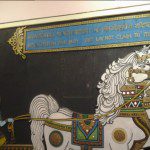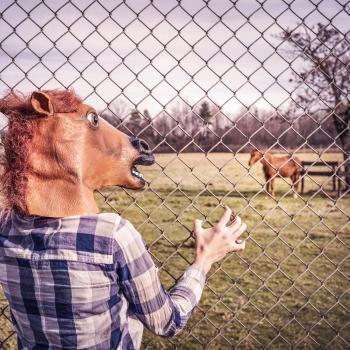We are doing a scripture study together: reading along through some scriptures and discussing the passages.
From the Winthrop Sargeant translation of The Gita…
19. He who imagines this (the embodied Self) the slayer
And he who imagines this the slain,
Neither of them understands.
This does not slay, nor is it slain.
20. Neither is this born nor does it die at any time,
Nor, having been, will it again come not to be.
Birthless, eternal, perpetual, primeval,
It is not slain when the body is slain.
21. He who knows this, the indestructible, the eternal,
The birthless, the imperishable,
In what way does this man cause to be slain, Arjuna?
Whom does he slay?
22. As, after casting away worn out garments,
A man later takes new ones,
So, after casting away worn out bodies,
The embodied Self encounters other, new ones.
23. Weapons do not pierce this,
Fire does not burn this,
Water does not wet this,
Nor does the wind cause it to wither.
24. This cannot be pierced, burned,
Wetted or withered;
This is eternal, all pervading, fixed;
This is unmoving and primeval.
25. It is said that this is unmanifest,
Unthinkable, and unchanging.
Therefore, having understood in this way,
You should not mourn.
These are some of the most beautiful lines of the Gita. Verse 19 I’ve heard translated as “He who thinks he can kill; He who thinks he can be killed, both are mistaken.” It’s one of my favorite quotes of all time. I can’t help but be carried away in the poetry of verses 23 to 25!
The Self has always been. It is now and it will never cease to be. This has always made me think of the scientific principle that energy can neither be created nor destroyed. It can change forms but it never leaves the system. Energy once existing in the world has always existed and will always exist.
There is something within us that does not die when the body dies. It is a fixed and steady existence within us, which is not pushed and pulled by all the ups and downs of the world. Like the Shakespeare sonnet, it is an “ever fixed mark that looks on tempests and is never shaken.”
Some other takes on it…
“Death is the separation of the subtle body from the physical body. The living entity is a traveler. Death is not the end of the journey of the living entity. Death is like a rest area where the individual soul changes vehicles, and the journey continues. Life is continuous and endless. Inevitable death is not the end of life; it is only an end of a perishable physical body. “ –http://www.gita4free.com/english_commentarygita2.html
“Krishna tells Arjuna that his dharma in this life is to be a warrior and rightfully fight against Duryodhana for the kingdom so that he may restore good — his karma requires this grand staging of good vs. evil to right the balance. It is not his duty to see myopically, to simply see the boundaries of life and death, but rather to live beyond results and in the larger cycle of samsara, or the karmic circle.” –http://www.gradesaver.com/bhagavad-gita/study-guide/section1/
I still worry that in the wrong hands, these words could be used as an excuse for massacre. Srila Prabhupada addresses my concern: “This, however, does not at all encourage killing of the body. The Vedic injunction is ma himsyat sarva bhutani: never commit violence to anyone. Nor does understanding that the living entity is not killed encourage animal slaughter. Killing the body of anyone without authority is abominable and is punishable by the law of the state as well as by the law of the Lord. Arjuna, however, is being engaged in killing for the principle of religion, and not whimsically.” –http://bhagwanshradha.wordpress.com/bhagavad-gita/the-gita-chapter-2/
It does remind me a bit of Raskilnakov in Crime and Punishment. He reads about the concept of a “super man” who is beyond human law, performing good and necessary action even if that means killing. He believes himself to be of that level and kills someone who is a bad person and a drain on society. However, the action haunts him and he finds it more and more difficult to hang onto his sanity. That’s fiction, of course, but it is a real danger for those who think they understand dharma as clearly as Sri Krishna and can make the decision of who should live and who should die.
“The soul is not born, but, because he takes on a material body, the body takes its birth. The soul does not take birth there, and the soul does not die. Anything which has birth also has death. And because the soul has no birth, he therefore has no past, present or future. ” –http://bhagwanshradha.wordpress.com/bhagavad-gita/the-gita-chapter-2/















